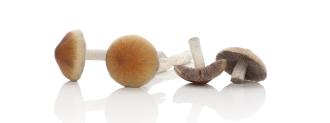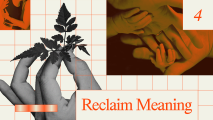Suspect that a psychedelic trip might improve your mental wellbeing? There’s now an app to help you find out.
Research has shown that pairing traditional talk-therapy sessions with one or more sessions during which a patient takes a psychedelic drug, such as ketamine or MDMA, may help treat depression, PTSD, and other mental illnesses (although such research is generally still preliminary).
But the number of clinics offering psychedelic-assisted therapy is still low — particularly in the U.S., where many psychedelics are entirely illegal — meaning not everyone can access the experimental therapy.
Additionally, some people who think they might benefit from psychedelic-assisted therapy could simply be wary of tripping outside their home or with a stranger, even a trained therapist.
Now, Field Trip (a company that offers psychedelic-assisted therapy at clinics in New York, L.A., and Toronto) has developed Trip, an app designed to help people glean the mental health benefits of psychedelics without a therapist.
The Field Trip App
Psychedelic-assisted therapy is typically broken into three phases: preparation, the psychedelic experience, and integration.
In the first phase, the therapist and patient discuss the therapy and its purpose during one or more sessions, going over the patient’s traumas or goals.
The psychedelic experience phase is just that: the session(s) during which the patient actually takes the drugs under the supervision of the therapist.
The final phase, integration, is one or more follow-up sessions during which the therapist helps the (sober) patient process their trip, talking about their experience and ways to integrate it into their lives.
We’re like Home Depot for self-exploration. You can do it, we can help.
Ronan Levy
The Trip app guides the user through the same pattern.
During the prep stage, the user fixes their intentions for the trip (“to process,” “to heal,” etc.) and chooses music.
They then take their psychedelic drug of choice — they must procure that on their own and determine their own dosage — and once they start to trip, they can use the app to record audio notes of what they’re thinking or experiencing to review later.
After the trip ends, they can use the App’s trip journal feature to process the experience, answering such prompts as “What emotion came up for you?” and “Where in your body did you feel that?”
Psychedelic-Assisted Therapy At Home
Field Trip doesn’t outright say on Trip’s website that the app is designed to be used with psychedelic drugs — that would violate the App Store’s rules — only that it’ll help users “make the most of (their) consciousness-expanding experiences,” such as meditation or breathwork.
But as the company’s cofounder Ronan Levy told Wired, it would be “naive” to think people wouldn’t use the app in conjunction with psychedelic drug trips.
“This way, at least, we can make sure you have well-considered instructions,” Levy said. “I like to say we’re like Home Depot for self-exploration. You can do it, we can help.”
Trip can help you make the most of your consciousness-expanding experiences.
Field Trip Health
But just like how the DIY creations that result from Home Depot purchases are often a far cry from those made by professionals, psychedelic-assisted therapy guided by a trained therapist seems like a more effective way to combat mental illness than journaling on your phone after taking some black market shrooms.
Still, psychedelic-assisted therapy at Field Trip’s clinics comes with a hefty price tag — a package with one consultation, six ketamine-infusion sessions, and nine integration sessions costs $4,700, Wired reports.
The Trip app is still only available on an early-access basis and Field Trip hasn’t revealed the cost, but it’ll almost certainly be cheaper — another way the app could increase access to at least some of the benefits of psychedelic-assisted therapy.
We’d love to hear from you! If you have a comment about this article or if you have a tip for a future Freethink story, please email us at [email protected].






